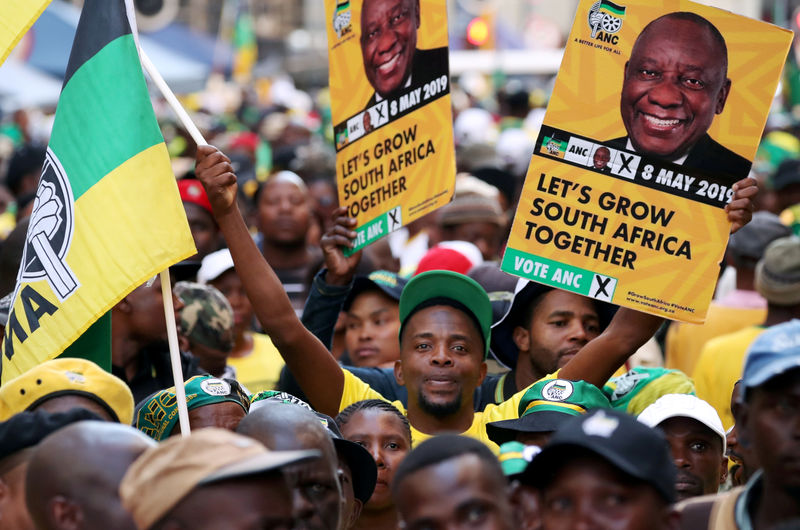By Tom Arnold
LONDON (Reuters) - South Africa's push to set up a sovereign wealth fund (SWF) seems like a stretch for a country with few resources to spare, but precedents show a well-managed seed fund could help attract and focus foreign investment.
The ruling African National Congress proposed an SWF in its manifesto for May's election but has not explained much about how it would be financed or what its strategic aims would be.
Minister of Trade and Industry Ebrahim Patel was nevertheless reported as saying at the recent G20 meeting in Japan that South Africa should immediately start the process of setting up a fund to prepare for future revenue streams.
SWFs range from intergenerational savings funds favored by commodity-rich nations to stabilization funds to help plug budgetary holes and strategic funds aimed at powering growth by supporting state-owned firms or bringing in foreign investment.
Analysts say South Africa could choose the latter model, often favored by governments without oil riches or the net export dollars associated with a current account surplus.
But some experts are skeptical.
"I don't have an objection to the idea of a sovereign wealth fund per se, just in the South African context I don't think it is appropriate to be spending our time on it," said Hugo Pienaar, chief economist at the South Africa-based Bureau for Economic Research.
"Given our twin fiscal and current account deficits, we don't generate excess cash to be channeled to a sovereign wealth fund."
Africa's most industrialized economy contracted sharply in the first quarter while its current account deficit widened to 2.9% of gross domestic product. The government expects a budget deficit of 4.5% of GDP for the fiscal year that began April 1.
South Africa relies on foreign portfolio inflows to finance the twin deficits, which have widened in recent years and are seen as a key economic weakness. The mining industry, the most likely source of revenues that could be diverted to the fund, generates around 8% of gross domestic product, less than half of what it contributed in 1980.
"Should a fund be launched without clear objectives, and be financed by significant debt, that would be ratings-negative if it struggled to keep the country's fiscal position on track," said Rachel Ziemba, founder of Ziemba Insights.
South Africa has just one investment-grade credit rating left and is worried that losing it will lead to big outflows of foreign investment.
RUSSIA, INDIA MODELS
If Johannesburg does opt for a strategic fund, it could look similar to those set up by India, France and Italy to entice foreign cash to enhance limited domestic firepower and funnel investment into local firms or costly areas like infrastructure.
Long-term investors -- often other sovereign funds or private equity -- are attracted by the perceived lower risk and access to the juiciest state assets.
"India's fund has been successful in galvanizing investment and could serve as a good example for South Africa if the government can find an initial capital contribution," said Victoria Barbary of the International Forum of Sovereign Wealth Funds.
India's National Investment and Infrastructure Fund invests in roads, ports, airports and power, with backers including the Abu Dhabi Investment Authority, Singapore's Temasek Holdings and Indian banks. It also oversees an India-focused fund-of-funds to which the Asian Infrastructure Investment Bank is committed.
The Russian Direct Investment Fund, established in 2011, has meanwhile become the main conduit for foreign investment into Russia, with its importance growing as U.S. sanctions against Moscow bite.
Barbary said South Africa could draw on the experience of state-owned asset manager Public Investment Corporation (PIC) to help build investment teams with the skills to identify opportunities.
With the economy frequently beset by blackouts and state-owned power supplier Eskom bleeding money, the country's creaking power industry would seem a potential starting point.
A problem with that is that any such fund could duplicate the work of existing institutions like South Africa's Industrial Development Corporation and Development Bank of Southern Africa, said Neville Chester, portfolio manager at Coronation Fund Managers.
"Very few foreign investors are going to commit real foreign direct investment -- a lot of our FDI tends to be portfolio flows rather than building factories, creating jobs -- without certainty on wider government policy and unfortunately that's where we have a vacuum," he added.
Governance concerns given corruption allegations against other state-owned institutions like PIC and Eskom and former President Jacob Zuma might also be off-putting for investors.

"There would need to be very stringent checks and balances in how the sovereign wealth fund is governed, what it may invest in," said Pienaar at the Bureau for Economic Research.